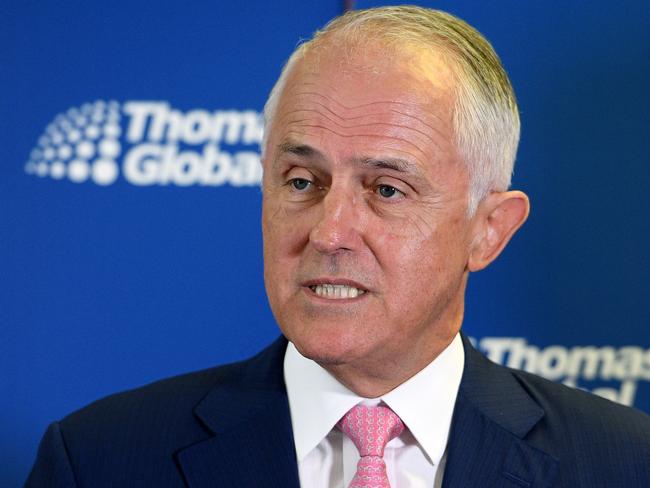Corruption watchdog: Bill Shorten to name National Integrity Commission among 2018 priorities
BILL Shorten today announced his intention to launch a federal corruption watchdog and look at raising the minimum wage if Labor wins the next federal election. VOTE, HAVE YOUR SAY
National
Don't miss out on the headlines from National. Followed categories will be added to My News.
BILL Shorten today announced his intention to launch a federal corruption watchdog and look at raising the minimum wage if Labor wins the next federal election.
The Opposition leader also signalled his aim to boost wages more broadly, to focus on closing the gender pay gap and to end ongoing price hikes in private health insurance.
In a major speech in Canberra today where he outlined his priorities for 2018 and his plan if he became prime minister, Mr Shorten also vowed to restore Sunday penalty rates, reform enterprise bargaining, put a renewed focus on climate change and restore public faith in politics after the “circus” of 2017.
“Getting working Australians a pay rise is key to confidence,” Mr Shorten told reporters at the National Press Club.
“I’m still conscious that for millions of working people, business as usual, wage stagnation as usual, simply isn’t good enough.
“The minimum wage is no longer a living wage.
“The current framework simply doesn’t give adequate consideration to contemporary cost of living pressures that working people are battling.”
Australia’s current minimum, as of July 2017, is $694.90 per week or $18.29 per hour.
Mr Shorten said government had to be mindful of the capacity of industry to pay higher wages but the nation needed to rebuild the idea that “a fairly paid workforce is a more productive workforce in a more profitable business”.
Under Labor’s plan for a federal corruption watchdog, Mr Shorten said his government would establish a National Integrity Commission within its first year in a bid to restore public confidence in politics.

It would be an independent agency which scrutinised possible misconduct by politicians, individuals, organisations or institutions.
Mr Shorten said rebuilding trust in politics should be treated with equal importance to national security as “the most corrosive sentiment in democracies around the world is the idea that politicians are only in it for themselves”.
While the majority did the right thing, Mr Shorten said: “So long as the political news is dominated by the minority who do the wrong thing — the travel rorts and dodgy donors and where cabinet ministers walk one day from their job and the next into a cushy job in the same sector — then we will always have a hard time convincing the Australian people we’re serving their interests and not our own.”
During the speech, Mr Shorten slammed the “circus” politics became in 2017, acknowledging he and Labor were part of the problem.
He highlighted the so-called citizenship saga as the worst example.
Mr Shorten said the new federal watchdog would be modelled on the lessons of the state anti-corruption bodies and would effectively operate as a standing Royal Commission.
“I’m not putting this policy forward because I’m aware of any corrupt conduct — if I was, I would report it,” Mr Shorten said.
“I’m doing this because I want to restore people’s faith in their representatives and the system.”
The Commission would also be able to hold public hearings and would report it’s findings to government annually.
During the speech, Mr Shorten reaffirmed Labor would go to the next election - which could be held anytime from August this year to May 2019 - with a policy of a 50 per cent renewables target by 2030, a 45 per cent cut in pollution by 2030, and zero net pollution by 2050.
He highlighted the importance of refocusing on climate change and transitioning back to renewables if Australia was to have lower energy prices and more secure power.

Prime Minister Malcolm Turnbull told reporters in Sydney the government was considering the recommendations of a Senate inquiry, which last year reviewed the need for a national integrity commission.
The Senate Committee stopped short of demanding a NIC in its report but recommended government “gives careful consideration“ to launching a federal agency which had a broad scope to address integrity and corruption matters.
Mr Turnbull said there had not previously been a federal watchdog established because neither side of politics supported on.
He also took at shot at Mr Shorten, questioning his integrity in opposing scrutiny of union corruption and calling him “no anti-corruption warrior”.
Mr Turnbull said Australia already had extensive anti-corruption measures covering federal agencies.
“As we all know, if you look around the states and territories, ... some of the ICACs have worked better than others.
“So, there is a lot of experience to learn from.
“It isn’t something to embark on in a rushed or ill-considered way.”
The Senate Committee also recommended Parliament appoint a Parliamentary Integrity Commissioner to “provide advice on matters of ethics to senators and members”.
